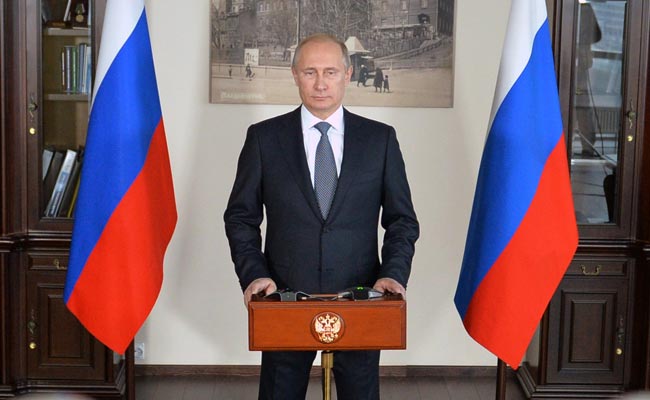

- Home/
- Top Stories/
- Russians Will 'Eat Less' for Vladimir Putin: Russia's Deputy Prime Minister
Advertisement
Russians Will 'Eat Less' for Vladimir Putin: Russia's Deputy Prime Minister
Associated Press | Updated: January 24, 2015 01:55 IST

File Photo: Russian President Vladimir Putin (Agence France-Presse)
Davos: Russian Deputy Prime Minister Igor Shuvalov, speaking at the World Economic Forum in Davos, on Friday warned the West against trying to topple President Vladimir Putin and said that Russians are ready to sacrifice their wealth in Mr Putin's support.
Russia has for the past year been sliding into recession amid a slump in its energy export prices as well as Western sanctions against Moscow's role in the conflict in Ukraine that has claimed more than 5,000 lives. Questions have been raised in Russia and abroad whether the price that ordinary Russians are having to pay for the annexation of Crimea is too high.
Mr Shuvalov, who is believed to be one of the richest men in the government, said that what he considers the West's attempts to oust Vladimir Putin will only unite the nation further.
"When a Russian feels any foreign pressure, he will never give up his leader," Mr Shuvalov said. "Never. We will survive any hardship in the country - eat less food, use less electricity."
His comments triggered pithy remarks on Russia social media including an opposition activist who posted photos of Mr Shuvalov's Moscow, London and Austria homes to illustrate where the Deputy Prime Minister would experience the hardships he described.
At the same panel in Davos, Mr Putin's long-time ally and former Finance Minister Alexei Kudrin said that Mr Putin clearly thinks that Russia's foreign policy interests at this point are worth the price the nation pays in higher inflation and the collapse of the Russian ruble.
Mr Shuvalov, who worked with Mr Kudrin until he resigned from the government in 2011, defended Russia's foreign policy but warned that Russia is "going into a longer crisis" compared with 2008, when it was battered for about two years by the global crisis.
Mr Shuvalov said Russia should focus on cushioning the economic fall through reforms and supporting the financial system. "It is going to get worse and the anti-crisis plan should be aimed at adapting to the hard landing," he said.
Russia's foreign currency reserves shrank by 2 per cent last week alone to $379 billion as the Central Bank sold foreign currency in a bid to prop up the ruble.
Russia has for the past year been sliding into recession amid a slump in its energy export prices as well as Western sanctions against Moscow's role in the conflict in Ukraine that has claimed more than 5,000 lives. Questions have been raised in Russia and abroad whether the price that ordinary Russians are having to pay for the annexation of Crimea is too high.
Mr Shuvalov, who is believed to be one of the richest men in the government, said that what he considers the West's attempts to oust Vladimir Putin will only unite the nation further.
"When a Russian feels any foreign pressure, he will never give up his leader," Mr Shuvalov said. "Never. We will survive any hardship in the country - eat less food, use less electricity."
His comments triggered pithy remarks on Russia social media including an opposition activist who posted photos of Mr Shuvalov's Moscow, London and Austria homes to illustrate where the Deputy Prime Minister would experience the hardships he described.
At the same panel in Davos, Mr Putin's long-time ally and former Finance Minister Alexei Kudrin said that Mr Putin clearly thinks that Russia's foreign policy interests at this point are worth the price the nation pays in higher inflation and the collapse of the Russian ruble.
Mr Shuvalov, who worked with Mr Kudrin until he resigned from the government in 2011, defended Russia's foreign policy but warned that Russia is "going into a longer crisis" compared with 2008, when it was battered for about two years by the global crisis.
Mr Shuvalov said Russia should focus on cushioning the economic fall through reforms and supporting the financial system. "It is going to get worse and the anti-crisis plan should be aimed at adapting to the hard landing," he said.
Russia's foreign currency reserves shrank by 2 per cent last week alone to $379 billion as the Central Bank sold foreign currency in a bid to prop up the ruble.
Published: January 24, 2015 01:55 IST
Latest Videos
More VideosComments












